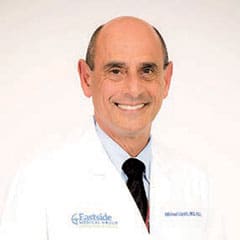
You may not know it, but coronary disease is the number one killer of men over 45. If you went to Las Vegas, wouldn’t you want to play the game with the highest odds of making you a winner? In this case, winning is living longer and healthier, so why not stack the deck in your favor as much as you are able?
So…..there are certain “risk factors” for heart attacks that we can control to some extent. Why not try your best to make sure that you can to improve your odds? You can’t pick different parents, but you can avoid cigarettes, exercise regularly, have your blood pressure and cholesterol checked. You can try to reduce stress and have tests that will determine your risk of having a heart attack. If I were a gambler, I would bet that you could lose those 10 or 20 lbs. if you really wanted to.
Short of having cardiac catheterization, all the tests that we do to determine the risk of a heart attack are probability tests. The electrocardiogram is like flipping a coin. It has a 50/50 chance of detecting a problem. It is known that the most common EKG finding when someone presents to the ER with a heart attack is “normal.” The EKG may not show changes for hours when someone is having a heart attack.
That is why we keep people in the hospital for further testing even when the first EKG shows no problems.
Next in line is the stress test. You walk on a treadmill with a gradual increase in speed and elevation. If you can get to the predicted maximal effort, there is an 85% chance that it can detect heart disease. If we add a nuclear isotope to the scan and perform the scan at rest and after exercise, the odds increase to 90%. Sound pretty accurate? That means that in one in 10 people, the test says that you have no problem when you do, or that you do have dis-ease when you don’t.
So how can we use a test that is wrong in so many patients? We do it by adding other data such as the patient’s history. The medical term for this is “the pretest probability” or Bayes’ Theorem. It goes something like this in patients with chest pain: If you are a 23-year-old non-diabetic, non-hypertensive female who has just lost her boyfriend, chances are that an abnormal test result is what we call a “false positive” meaning that the test is abnormal but in fact, you have no disease. If, on the other hand, you are a 65-year-old 2 pack a day smoking, hypertensive, overweight inactive male with a strong family history for early coronary artery disease, and chest pain on exertion, chances are that a normal test result is what we call a false negative; that is, you have a disease that is missed by the test.
That’s where the gold standard comes in. Cardiac catheterization allows us to put dye into the lumen (think of the hole in a doughnut with the doughnut as the artery and the hole as the path of blood) of the artery and visualize areas of narrowing (stenosis). It is agreed that if the lumen has more than 50% of it’s diameter filled with plaque (cholesterol, platelets, calcium) it will benefit from a revascularization procedure such as angioplasty/stenting or bypass surgery. In the case of the 23-year-old woman, we do the catheterization as a last resort. In the case of the male with multiple risk factors, we need little evidence to recommend a definitive study.
So why tempt fate? If you are a male over 40, go to a physician and get an evaluation to exclude coronary heart disease. Start an exercise program of walking for at least 30 minutes 3 days a week.
Have your cholesterol checked, as well as your blood pressure and pulse. Try to reduce stress in your life. Like they do in Las Vegas, do everything you can to help make sure that the odds are in your favor.
Michael Lipsitt, MD FACC SCAI Interventional Cardiologist
Eastside Heart and Vascular
1700 Medical Way, Snellville, GA 30078 (770) 736-6300
EastsideHeart.com

